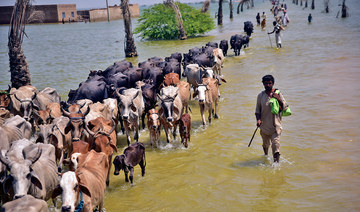OLDHAM : Shanaz Saddique is one of a surge of pro-Palestinian candidates hoping to mobilize Muslim votes at Britain’s July 4 election by tapping into discontent over the two main political parties’ positions on the war in Gaza.
Both the ruling Conservatives and the resurgent Labour party have said they want the fighting to stop, but have also backed Israel’s right to defend itself — angering some among the 3.9 million Muslims who make up 6.5 percent of Britain’s population.
Few, if any, of the pro-Palestinian candidates running as independents or for non-mainstream parties will get elected to parliament, but “The Muslim Vote” campaign is looking to win enough votes to send a strong message to those who do.
“Gaza is ... not about a political argument. It’s a human rights argument,” Saddique, who is running to be elected as a Member of Parliament for Oldham East and Saddleworth north of Manchester told Reuters,
“We do not apologize for being the Gaza party.”
The Muslim Vote campaign is advising voters to pick pro-Palestine candidates running as independents or from smaller parties like the left-wing Workers Party, which has put up 152 candidates including Saddique.
The party’s outspoken leader George Galloway won a special election in March for a vacant parliamentary seat in Rochdale, a neighboring town to Oldham, which also has a big Muslim population, after Labour withdrew support from its candidate over a recording espousing conspiracy theories about Israel.
The latest war began when Hamas burst into southern Israel on Oct. 7, killed 1,200 people and took around 250 hostages, according to Israeli tallies. The offensive launched by Israel in retaliation has killed nearly 38,000 people, according to the Gaza health ministry.
There are around 230 more independent candidates running in this election than at the last vote in 2019. In areas with large concentrations of Muslim voters, many of those independents are running on a pro-Palestinian platform, according to Sophie Stowers of the UK in a Changing Europe think tank.
The most likely to feel the effect of unhappiness among Muslim voters is Keir Starmer’s Labour Party which is still predicted to win the election, but has long counted on the backing of Muslim and other minority groups.
Starmer’s Labour has faced criticism and risks losing voters for only gradually shifting toward calling for a ceasefire in Gaza. Labour has committed to recognizing a Palestinian state but has not set out a definitive timetable for doing so.
“I’ve been a long Labour supporter ... but no more, not my family. We are not supporting Labour,” said Rafit Hussain, 51, a shop-owner in the historically Labour-voting Oldham.
“Genocide is happening in front of our eyes and nothing’s been done about it ... which is very upsetting and very sad.”
A Savanta poll last month found that 44 percent of Muslims who ranked the conflict as one of the top five issues would consider backing an independent running on the issue.
Poppy Yousaf, another Oldham local, is one of those who has heard their message: “I will vote this year looking at independents, because I don’t think the Tory (Conservative) government or the Labour government have quite promised or done things that sit right with my conscience.”

























